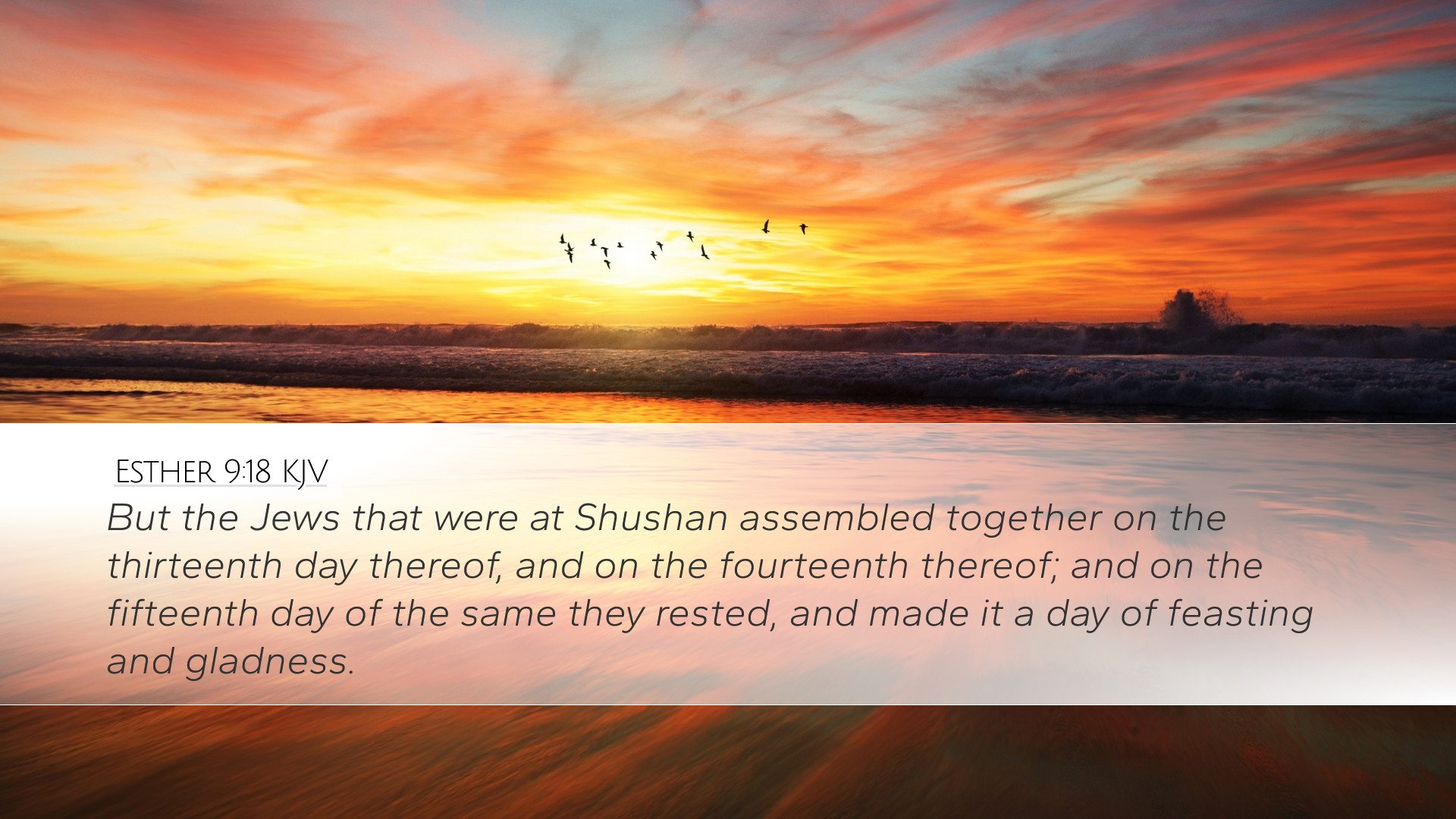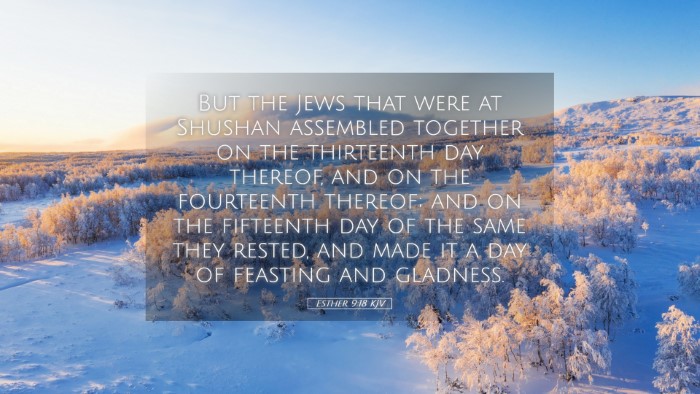Esther 9:18 - Commentary and Insights
Bible Verse: "But the Jews that were at Shushan assembled together on the fourteenth day of the month Adar; and they killed three hundred men at Shushan, but on the spoil they laid not their hand."
Introduction
The Book of Esther presents a unique narrative in the Scriptures, blending historical events with profound theological insights. Esther 9:18 captures a pivotal moment in the Jewish people's deliverance from their enemies, particularly focusing on the events that unfolded in Shushan, the capital of Persia. This commentary synthesizes the insights of esteemed biblical commentators such as Matthew Henry, Albert Barnes, and Adam Clarke to provide a comprehensive understanding of this verse.
Contextual Background
To appreciate Esther 9:18 fully, one must consider the broader context of the narrative. The Jews had been threatened with annihilation under Haman's decree, but through Esther’s brave intercession and Mordecai's wisdom, they were able to turn the tables on their adversaries. The decree allowing the Jews to defend themselves against their attackers was issued, leading to a day designated for their rescue and retribution.
The Significance of Shushan
Shushan, as the fortified capital, serves as a microcosm of the greater struggle faced by the Jewish people. Albert Barnes notes that the reference to Shushan emphasizes the intensity of the threat against the Jews and underscores the victory achieved in this pivotal location. The gathering of the Jews here signifies unity and collective strength as they faced their enemies.
Analysis of the Key Elements
Assembled Together
The phrase "assembled together" reveals the communal nature of the Jewish response to danger. Matthew Henry highlights how the Jews came together not only physically but spiritually, encouraging one another in their resolve. This point exemplifies the importance of unity in the face of adversity—a theme deeply woven throughout the Scriptures.
The Fourteenth Day of Adar
The selection of this specific date holds significant meaning. Adam Clarke explains that the Jews celebrated their victory on the fourteenth day of Adar, marking it as a day of rejoicing and remembrance. This timing reflects God's providence, wherein the day originally intended for destruction was transformed into one of deliverance and celebration.
Killed Three Hundred Men
The text states, "they killed three hundred men at Shushan." This accounts for the vigorous defense the Jews mounted against their adversaries. Henry notes that this number, while not insignificant, was a small fraction of the total enemies vanquished throughout the empire. The precision of the reported number emphasizes God's hand in their victory and serves as a testimony to His faithfulness towards His people.
But on the Spoil They Laid Not Their Hand
This concluding clause of the verse is rich in theological implications. Both Clarke and Barnes emphasize the restraint shown by the Jews in this victory. Instead of greedily taking the spoils of war, they chose to honor the edict of self-defense rather than aggression. This reflects obedience to their original command and highlights the moral integrity characteristic of the Jewish people. Their deliberate choice not to lay a hand on the spoil signifies a clean victory, prioritizing justice over greed.
Theological Implications
Esther 9:18 encapsulates themes central to Jewish identity, including deliverance, justice, and communal solidarity. The victory of the Jews over their enemies serves as a testament to divine providence and intervention. It also presents believers with a model of ethical conduct in times of conflict, emphasizing that moral choices must prevail even amid victory.
Divine Providence
The events leading to this moment reflect God’s sovereignty in orchestrating the events of history for His people. Each commentator expresses that though God is not overtly mentioned in the Book of Esther, His hand is evident throughout the narrative. The deliverance of the Jews serves as a reminder of the ongoing struggle between good and evil, reinforcing that God can turn situations of despair into triumphs of joy.
Ethical Conduct in Conflict
Pastors and theologians can draw from this passage to teach congregations about the importance of maintaining ethical integrity. The Jews’ refusal to take spoil is a lesson on self-restraint and prioritizing divine justice over personal gain. This is particularly meaningful for students of theology, as it presents a framework for understanding how to respond in challenging circumstances without compromising one’s moral convictions.
Conclusion
In conclusion, Esther 9:18 serves as a powerful reminder of the sovereignty of God, the importance of community in adversity, and the necessity of moral integrity. Their actions resonate with believers today, challenging them to adhere to principles of justice and righteousness in their own lives. This verse, rich with historical and spiritual significance, invites both pastors and scholars to reflect deeply on God’s promises and faithfulness to His people.


